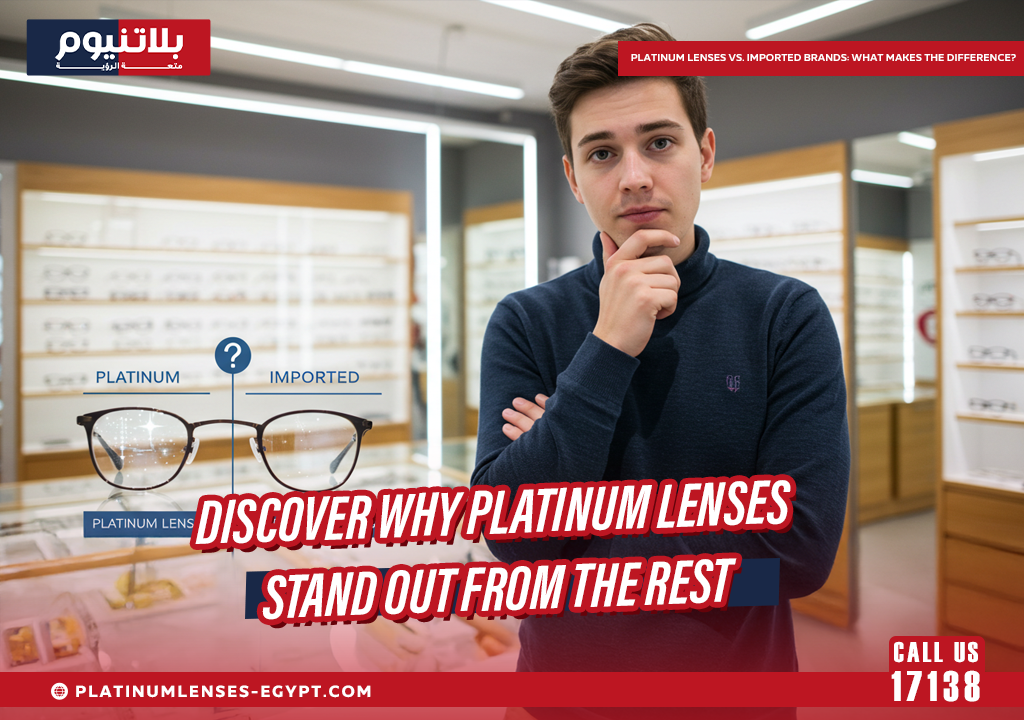When it comes to choosing optical lenses for your eyeglasses, the market offers a wide range of options—from internationally imported brands to high-quality local alternatives like Platinum Lenses. But which one truly delivers the best value, clarity, and comfort?
In this article, we’ll explore the key differences between Platinum Lenses and imported lens brands, focusing on factors like technology, manufacturing quality, customization, affordability, and after-sales support. By the end, you’ll have a clear idea of what makes Platinum stand out—and why it might just be the smarter choice.
Are All Optical Lenses the Same?
At first glance, most optical lenses might look identical. However, the real difference lies in:
- The technology used in lens design
- The material quality
- The customization accuracy
- The coating durability
- The warranty and customer service
Imported brands often come with global reputations, but that doesn’t always guarantee a better experience—especially when local options like Platinum Lenses offer matching or superior features tailored for regional needs.
1. Technology and Digital Precision: Who Leads the Game?
Imported Brands
Most international brands use advanced technologies such as:
- Free-form surfacing
- Wavefront optimization
- Smart light adaptation
However, their production is usually centralized in global hubs, meaning turnaround times are longer and custom adjustments may be less localized.
Platinum Lenses
Platinum uses European manufacturing technologies with Japanese design expertise to deliver locally optimized lenses. Advanced tech includes:
- Digital Ray-Path® 2 for enhanced clarity in progressive lenses
- Steady Methodology™ to reduce swim effect in multifocals
- Blue Cut Technology for screen users
- MIRA Coatings for anti-glare, anti-smudge, and UV protection
Platinum Lenses are digitally optimized based on the wearer’s lifestyle and visual behavior—ensuring ultra-personalized vision correction.
2. Material Quality and Durability
Imported Brands
Often use high-index plastics and glass materials suitable for various refractive errors. However, not all imported lenses are durable—some may lack effective scratch resistance or UV protection unless additional coatings are purchased.
Platinum Lenses
Platinum selects high-grade optical materials, including:
- CR-39, Polycarbonate, Trivex®, and High-Index polymers (1.60–1.74)
- All lenses undergo multi-layer coating processes to enhance strength, clarity, and longevity.
- Even ready-made lenses from Platinum come with anti-reflective and scratch-resistant coatings by default.
This makes Platinum a trusted option not just for regular wearers but also for children and seniors needing high durability.
3. Customization and Lens Types: More Flexibility with Platinum
Imported lenses often come in fixed design templates, requiring opticians to choose from preset categories.
Platinum, on the other hand, offers a wide range of fully customizable lenses to match every age, need, and lifestyle:
| Use Case | Recommended Platinum Lens |
| Kids with myopia | MYO D (Myopia Control) |
| Office workers | Office Lens + MIRA Blu |
| Progressive wearers | X-Tend / X-Perience |
| Fashion users | MIRA Mirror or Photochromic |
| High prescriptions | HD UT / High-Index Slim |
With Platinum, you’re not just choosing a lens—you’re designing it around your life.
4. Coatings: MIRA vs. Generic AR
Most imported brands offer standard anti-reflective coatings at an additional price, which may not perform well in local weather conditions.
Platinum’s MIRA Coating System includes multiple types, each serving a specific lifestyle or medical need:
- MIRA Plus: Basic anti-reflection + UV block
- MIRA Max: Premium water-, dust-, and fingerprint-resistant layer
- MIRA Blu: Blue light filter for digital protection
- MIRA Drive: Designed to reduce glare while driving
- MIRA Mirror: Reflective finish for style + double UV defense
Especially in sunny or dusty environments like Egypt, MIRA coatings offer superior durability and comfort.
5. Affordability and Value
Imported brands often come with premium pricing, not necessarily reflecting superior functionality. You’re paying more for the brand name and shipping.
Platinum Lenses provide better cost-to-benefit ratios, offering:
- European-quality manufacturing
- Lower shipping and tax costs
- Faster delivery times
- Excellent warranty terms
Get world-class quality at a price designed for your local budget.
6. After-Sales Support and Warranty
Imported Brands
- Usually managed through international distributors
- Longer waiting periods for warranty claims or remakes
Platinum Lenses
- Local customer service
- Warranty activation via website
- Faster issue resolution for repairs or reorders
- 1-year warranty against manufacturing defects
Peace of mind comes easier when your lens provider is just a call away.
7. What About Ready-Made Lenses?
Platinum also offers premium ready-made lenses for fast delivery:
- EroLite: Lightweight and durable for quick vision correction
- Platinum Plus: Balanced clarity and coating
- Blue Steel G2: With built-in blue light defense
- Sun Actives: Light-reactive lenses that work like photochromics
These lenses offer excellent alternatives to imported readers or over-the-counter glasses with no tech.
FAQs :
- Are Platinum Lenses as durable as imported brands?
*Yes. Platinum uses multi-layer coatings (e.g., MIRA Max) that rival imported options like ZEISS DuraVision Platinum, offering scratch resistance, anti-glare, and UV protection 1016. Their high-index materials (1.60–1.74) match international standards for strength and clarity .* - Do Platinum Lenses offer blue-light protection?
Absolutely. Platinum’s MIRA Blu coating filters blue light from screens, similar to imported blue-cut lenses. This is ideal for office workers and heavy device users . - How do Platinum photochromic lenses compare to Transitions®?
Platinum’s Sun Actives darken quickly outdoors (15–30 seconds) and clear indoors without residual tint. While Transitions® dominate globally, Platinum’s localized R&D ensures better performance in regional climates . - Are Platinum Lenses cheaper than imported brands?
*Often, yes. Platinum avoids import taxes and shipping costs, passing savings to customers. For example, their high-index lenses cost 20–30% less than comparable ZEISS or Hoya options .* - Can I get progressive lenses with Platinum?
Yes. Platinum’s X-Tend and X-Perience progressive lenses use Free-Form design for wider fields of view, competing with imported brands like Varilux. Customization is tailored to local prescriptions
Conclusion: Is Platinum Lenses the Smarter Choice?
If you’re looking for advanced design, fast customization, smart coatings, and affordable value—Platinum Lenses easily rival (and often outperform) many imported brands.
They combine:
World-class optical technology
Local understanding of visual needs
High-quality materials and coatings
Versatility across all age groups and use cases
Fast, reliable after-sales service
Whether you’re buying your first glasses, upgrading to progressive lenses, or choosing protective lenses for your kids—Platinum Lenses are a safe, high-performing, and economically smart option for clear and healthy vision.

